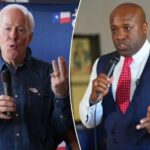
Authored by Janice Hisle via The Epoch Times (emphasis ours),
Former U.S. President Donald Trump says he finally sees some truth emerging about “the fake news.”

More than six years after the media began covering the former president’s alleged collusion with Russia–which Trump calls “the Russia, Russia, Russia” hoax–has been dissected from within journalism.
The Columbia Journalism Review (CJR), which calls itself “the most respected voice on press criticism,” recently published findings from an 18-month investigation: a 24,000-word expose’ entitled, “The Press Versus The President.”

Days later, Trump reacted with righteous indignation to the tactics of the press, as revealed in the CJR article.
“It is a STAGGERING, detailed account of the lies, disinformation, and complete lack of journalistic integrity,” Trump wrote Feb. 2 on Truth Social, singling out “the purveyors of Fake News at the Washington Compost (sometimes known as the Washington Post), the Failing New York Times, and many others.”
Trump also decried the incalculable damage that dishonest coverage caused to his 2020 reelection bid.
“This Fake News, with all of its disinformation, had a huge impact on the 2020 Presidential Election, just one of the many ways that the Election was Rigged and Stolen,” he wrote in another Truth Social message. “This proves, once again, that the Corrupt, Woke, Radical Democrats stole the 2020 Election, making it impossible for that fact to be called ‘the Big Lie,’ as the Marxists and Communists in our Country attempt to portray it.”
Meanwhile, Trump’s allies cried out for media outlets to correct the record as his campaign to win back the White House gains momentum. Detractors, however, fault CJR for failing to put Trump himself far enough under the microscope.
Important but Too Long
CJR, in an introduction to its piece, wrote that the investigation’s findings “aren’t always flattering, either for the press or for Trump and his team.” CJR predicted that the article’s revelations would be “debated and maybe even used as ammunition in the ongoing media war being waged in the country.”
American computer analyst turned Russian citizen Edward Snowden, best known for leaking information about the National Security Administration’s spying on Americans, weighed in with a brief analysis on Twitter for people who may think the piece was “TL/DR,” an abbreviation for “too long, didn’t read.”
His summary of the CJR’s findings: Corporate media “knowingly suppressed facts that cut against popular narratives, ignored denials, eagerly laundered partisan attacks via ‘anonymous sources,’ and refuses to reflect on mistakes.”
CJR said its article raises issues that are “important, and worthy of deep reflection as the campaign for the presidency is about, once again, to begin.”
The publication also wrote: “No narrative did more to shape Trump’s relations with the press than Russiagate.”
That term refers to the FBI’s investigation of Trump, which began while President Barack Obama was in office and Trump was then running his first presidential campaign. Information later surfaced revealing that the federal government relied in large part on a “Trump-Russia dossier” to justify its investigation.
But that dossier was found to be of dubious origin. A former British spy, hired by people with connections to Trump’s political opponent, Hillary Clinton, used unverified information from people with ties to Russia.
Despite a 22-month investigation by former special counsel Robert Mueller, none of the 103 allegations in the dossier was declared valid.

Big Impact
Reporting on the allegations “resulted in Pulitzer Prizes as well as embarrassing retractions and damaged careers,” CJR noted. “For Trump, the press’s pursuit of the Russia story convinced him that any sort of normal relationship with the press was impossible.”
When Trump first announced his run for president in 2016, the real estate magnate/media personality was laughed off as a joke. But then he morphed into somewhat of a media darling. Everything Trump-related became clickbait. Before long, however, the media put Trump in its crosshairs; reporters were “going all in on efforts to catalogue Trump as a threat to the country,” CJR wrote.
The publication said journalist Jeff Gerth took an “encyclopedic look at one of the most consequential moments in American media history.” Gerth is an investigative reporter who worked for almost three decades at The New York Times. His investigation for CJR required interviews with dozens of insiders connected to Trump and media organizations.
Gerth wrote that the U.S. news media’s coverage of Trump helped sink the American people’s trust in journalists.
Read more here...
Authored by Janice Hisle via The Epoch Times (emphasis ours),
Former U.S. President Donald Trump says he finally sees some truth emerging about “the fake news.”

More than six years after the media began covering the former president’s alleged collusion with Russia–which Trump calls “the Russia, Russia, Russia” hoax–has been dissected from within journalism.
The Columbia Journalism Review (CJR), which calls itself “the most respected voice on press criticism,” recently published findings from an 18-month investigation: a 24,000-word expose’ entitled, “The Press Versus The President.”

Days later, Trump reacted with righteous indignation to the tactics of the press, as revealed in the CJR article.
“It is a STAGGERING, detailed account of the lies, disinformation, and complete lack of journalistic integrity,” Trump wrote Feb. 2 on Truth Social, singling out “the purveyors of Fake News at the Washington Compost (sometimes known as the Washington Post), the Failing New York Times, and many others.”
Trump also decried the incalculable damage that dishonest coverage caused to his 2020 reelection bid.
“This Fake News, with all of its disinformation, had a huge impact on the 2020 Presidential Election, just one of the many ways that the Election was Rigged and Stolen,” he wrote in another Truth Social message. “This proves, once again, that the Corrupt, Woke, Radical Democrats stole the 2020 Election, making it impossible for that fact to be called ‘the Big Lie,’ as the Marxists and Communists in our Country attempt to portray it.”
Meanwhile, Trump’s allies cried out for media outlets to correct the record as his campaign to win back the White House gains momentum. Detractors, however, fault CJR for failing to put Trump himself far enough under the microscope.
Important but Too Long
CJR, in an introduction to its piece, wrote that the investigation’s findings “aren’t always flattering, either for the press or for Trump and his team.” CJR predicted that the article’s revelations would be “debated and maybe even used as ammunition in the ongoing media war being waged in the country.”
American computer analyst turned Russian citizen Edward Snowden, best known for leaking information about the National Security Administration’s spying on Americans, weighed in with a brief analysis on Twitter for people who may think the piece was “TL/DR,” an abbreviation for “too long, didn’t read.”
His summary of the CJR’s findings: Corporate media “knowingly suppressed facts that cut against popular narratives, ignored denials, eagerly laundered partisan attacks via ‘anonymous sources,’ and refuses to reflect on mistakes.”
CJR said its article raises issues that are “important, and worthy of deep reflection as the campaign for the presidency is about, once again, to begin.”
The publication also wrote: “No narrative did more to shape Trump’s relations with the press than Russiagate.”
That term refers to the FBI’s investigation of Trump, which began while President Barack Obama was in office and Trump was then running his first presidential campaign. Information later surfaced revealing that the federal government relied in large part on a “Trump-Russia dossier” to justify its investigation.
But that dossier was found to be of dubious origin. A former British spy, hired by people with connections to Trump’s political opponent, Hillary Clinton, used unverified information from people with ties to Russia.
Despite a 22-month investigation by former special counsel Robert Mueller, none of the 103 allegations in the dossier was declared valid.

Big Impact
Reporting on the allegations “resulted in Pulitzer Prizes as well as embarrassing retractions and damaged careers,” CJR noted. “For Trump, the press’s pursuit of the Russia story convinced him that any sort of normal relationship with the press was impossible.”
When Trump first announced his run for president in 2016, the real estate magnate/media personality was laughed off as a joke. But then he morphed into somewhat of a media darling. Everything Trump-related became clickbait. Before long, however, the media put Trump in its crosshairs; reporters were “going all in on efforts to catalogue Trump as a threat to the country,” CJR wrote.
The publication said journalist Jeff Gerth took an “encyclopedic look at one of the most consequential moments in American media history.” Gerth is an investigative reporter who worked for almost three decades at The New York Times. His investigation for CJR required interviews with dozens of insiders connected to Trump and media organizations.
Gerth wrote that the U.S. news media’s coverage of Trump helped sink the American people’s trust in journalists.
Read more here…
Loading…






